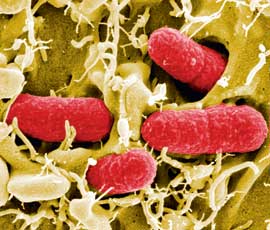Antibiotics blamed for rise in resistant E coli

The Soil Association has blamed a rise in prevalence of a resistant form of E coli on the over-use of antibiotics on livestock farms.
The pro-organic body made the accusation in its report, E coli superbugs on farms and food, which focuses on a type of the bacterium known as extended-spectrum beta-lactamase E coli.
The report was handed to the national media yesterday (Thursday 29 March) and it details how the disease causes severe illnesses in humans, who are three times more likely to die from EBSL E coli infections than from other forms of the disease.
Government scientists have branded the bug as “extremely resistant” to many classes of antibiotics and “more virulent” than other forms of E coli, the report says.
The report adds that the prevalence of the bug on British farms has increased dramatically since it was first identified in 2004.
Richard Young, Soil Association policy adviser and co-author of the report, claimed there was evidence linking farm use of antibiotics with a rise in drug resistance.
He pointed to research work detailed in the report which claims that the spread of the cases in humans across a wide geographical area of the UK could only be linked to the food the victims consumed.
“The UK does not have an effective strategy for addressing the rising levels of antibiotic resistance on farms and food, and is the only EU country still allowing antibiotics to be advertised to farmers,” he added.
The farm use of antibiotics per animal was at its highest-ever level in 2010, 18% higher than in 2000, while the use of modern cephalosporin antibiotics, which most strongly encourage ESBL E coli, has increased more than six-fold despite falls in livestock numbers, Mr Young said.
The Soil Association has won the backing of Dai Grove-White, from the School of Veterinary Science, Liverpool University, who in a statement of support said:
“It is essential that all the relevant stakeholders, namely governments, farmers, veterinary surgeons, retailers and consumers, participate in this debate to ensure the protection of both human and animal health and allow farming to rise to the inevitable challenges of the next 50 years without jeopardising human health.”
The Soil Association is now calling for five action points to be addressed
Phasing out preventative use of antibiotics
Halving antibiotic use on farms within five years
Moving towards less intensive production systems
Greatly reduce the use of modern cephalosporins and fluoroquinolones
Prohibit the advertising of antibiotics
